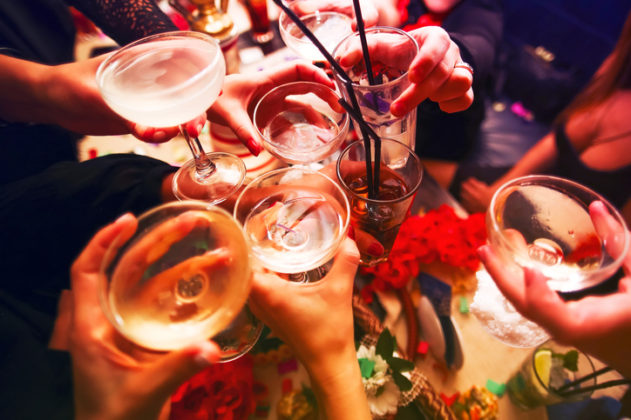A deep sadness began to wash over me as I realized that America was opting for a man endorsed by the KKK after electing its first black president. I wanted nothing more than to wash away our collective sins in the warm golden glow that only alcohol could provide.
It had been 10 days since my last drink: “This is easier than I remember,” I thought confidently to myself as I prepared for what was sure to be an exhilarating Election Day 2016. Then Trump happened.
I was fundraising in Seattle’s trendy bar district, Capitol Hill, home to IPA-swigging hipsters and local celebrities Dan Savage and Macklemore. The air was thick with anticipation as women in pantsuits and little girls dressed in all white paraded by me. Above me a ballroom had been turned into an election-night bar and viewing venue. People cheered, laughed, and yelled. It was a sporting event of sorts—the first female nominee vs. the orange-faced man.
The polls, as we now know all-too-well, had been lying to us all day: “Eighty percent chance of Hillary Clinton winning,” predicted Bing earlier that morning. Puffed up on a false sense of security, most of my friends started celebrating (a.k.a. getting loaded) early.
They weren’t alone.
While drinking and presidential elections have historically gone hand-in-hand, this one seemed cause for even more celebration (i.e. intoxication). In fact, Google was reporting a +220% spike in searches for “election drinking game.” A Philadelphia-based news site published an article about the “best places you can get blackout drunk in Philly” assuring readers that, “on a night like this you’re going to want to drink heavy.” They didn’t have to tell me twice.
All I could think about was throwing back shots with my friends when Trump won a shoo-in state like Oklahoma and clinking glasses as Hillary made history. I wanted so badly to be a part of it—to celebrate with them after I’d raised my last dollar for the day. To usher in the first female commander-in-chief with a good buzz.
But I was resolved in my sobriety. I’d close up the office and head home to watch the election results with my partner. Maybe I’d make some popcorn. I was in good spirits, after all; feeling positive about the election and confident in my fellow countrymen and women.
But as I stood out in the Seattle drizzle battling my inner lush, a strange shift began to occur: The streets, which were previously frantic, became still and stagnant. The cheers and yelling pouring out of the bars and into the alleys silenced. My heart sank: Things were not going the way we thought they would.
I watched as the electoral map began to turn red: Texas, Florida, Pennsylvania, Wisconsin. In disbelief, my friends began emoting on Facebook: “This can’t be happening!” was soon followed by, “At least there’s alcohol!” Stronger Together became Drunker Together. All around me people were drowning their sorrows in booze.
A deep sadness began to wash over me as I realized that America was opting for a man endorsed by the KKK after electing its first black president. I wanted nothing more than to wash away our collective sins in the warm golden glow that only alcohol could provide. Numb. The. Pain.
The days following the election only got worse. I began attending 12-step meetings in hopes of finding people like me. I wasn’t disappointed.
Turns out, Trump winning the election was a major trigger for other people in recovery—a test of our commitment to sobriety. Trump, or rather America electing him, inspired such a depth of despair, hurt, and sadness that even the strongest among us were tempted. One person shared that many of their friends in recovery went out to drink that night. Another confessed screaming alone in a barn because they were so frustrated.
These were people with notches in their belt—some with 20-plus years of sobriety. And yet, they too were so affected by the results of the election that they almost stumbled—some did.
It’s been three weeks now and I still haven’t touched a drop. I’m still attending the step meetings where Trump and the direction of the country remain reoccurring themes. Some members are still despairing—hoping to wake on November 9th from a bad dream.
But all of us are doing something—whether it’s protesting, volunteering, or reaching out to our politically-antithetical family on social media. That’s the cool thing about recovering addicts (and perhaps even addicts), we are stubborn af.
My 30-day sobriety workbook defines a hero as, “someone who does what needs to be done.” I like that definition because, as it turns out, surviving a Trump presidency and recovering from addiction have a lot in common: Both are going to require vigilance, perseverance, belief in the future, and hella support from each other.
Jessica Schreindl is a freelance writer and TV producer in Seattle, Washington. She is a contributing writer for Mic.com and has been published on Feministing.com. She graduated with her M.A. from Syracuse University where she studied film history and documentary filmmaking.
Other Links:

